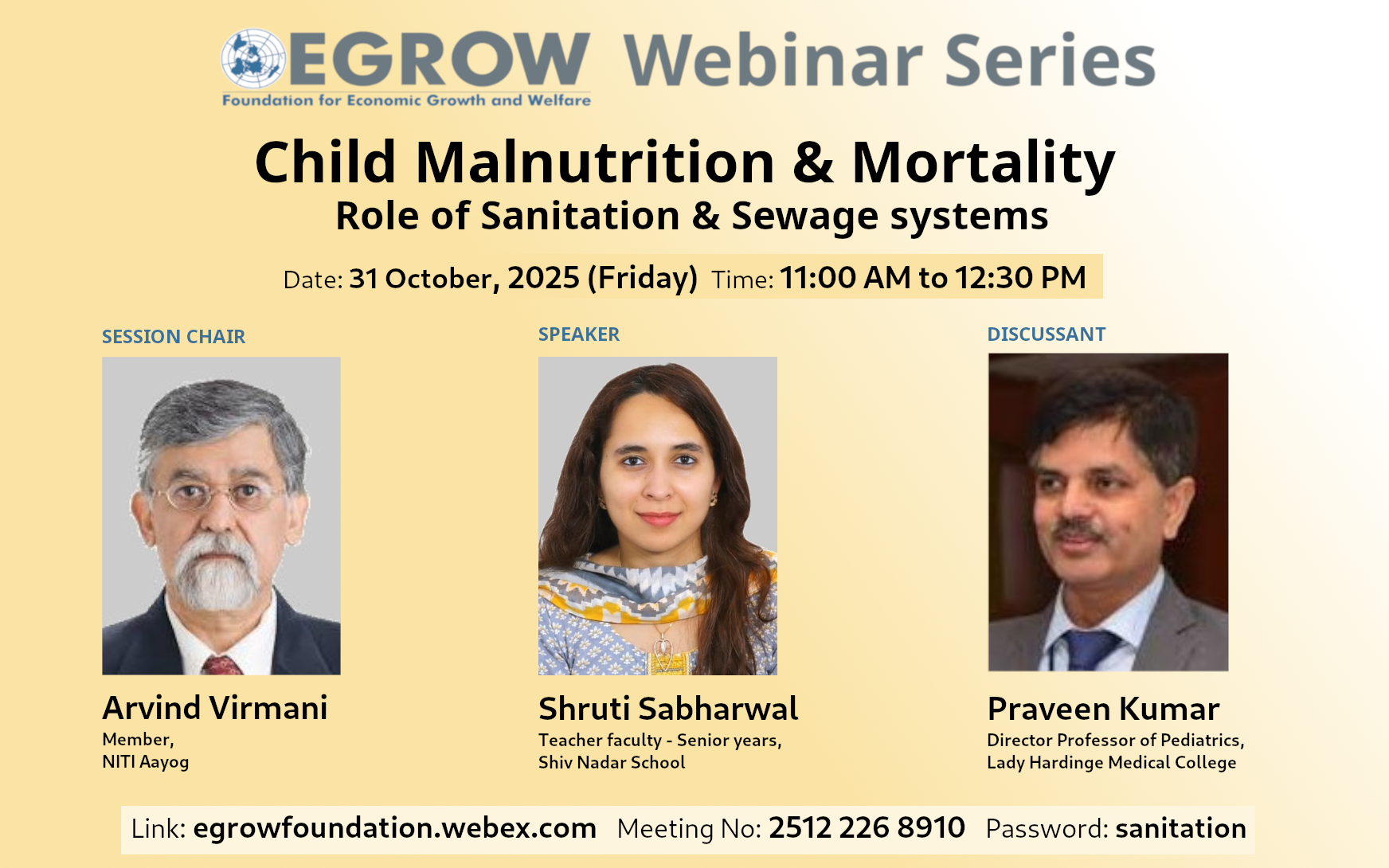Child Malnutrition & Mortality: Role of Sanitation & Sewage systems

Webinar Link
Meeting No: 2512 226 8910
Password: sanitation
Certificate of Participants
To recieve certificates, please register and attend
Abstract
Child malnutrition and child mortality remain persistent public-health challenges in developing economies, despite gains in income, food access and healthcare. Evidence increasingly shows that inadequate sanitation and unsafe sewage disposal are fundamental drivers of poor child health. Open defecation and mismanaged human waste increase exposure to pathogens, fuelling chronic infections and environmental enteric dysfunction that undermine nutrient absorption and immunity. These biological pathways link sanitation deficits to undernutrition and higher risk of early death. Beyond infrastructure gaps, behavioural and social factors — including toilet-sharing norms, hygiene practice and maternal education — shape the realised health impact of sanitation. The policy frontier lies in coupling toilet coverage with sewage quality, integrating sanitation with nutrition–health programmes, and sustaining behaviour change through education. The webinar will deliberate on concrete, scalable and coordinated policy actions in sanitation quality which spans not only infrastructure but also behaviour change and institutional delivery.
About the Speakers
Arvind Virmani
Arvind Virmani is member of NIti Aayog. He was Chairman of the Foundation for Economic Growth and Welfare (EGROW) and President of the Forum For Strategic Initiatives (FSI, Delhi). He has been a Mentor (economic policy) to FICCI & a member of RBI Technical Advisory Committee on Monetary policy. He was earlier Executive Director, IMF and Chief Economic Advisor, Ministry of Finance and Principal Advisor, Planning Commission. During his tenure he advised on a host of economic policy reforms, through 100s of policy papers, notes and committees. He has served as Member, Telecom Regulatory Authority of India (TRAI) and as Director & Chief executive of the Indian Council for Research on International Economic Relations (ICRIER). He has published 35 journal articles and 20 book chapters and written over 50 other working papers in the areas of Macroeconomics, growth and finance, tax reform, International trade & Tariffs, International relations, and national security strategy.
Shruti Sabharwal
Shruti is a PGT (Post Graduate Teacher) at Shiv Nadar School with over three years of experience teaching economics at the higher education level. Before joining Shiv Nadar School, Shruti contributed to key policy initiatives during a year-long research tenure at NITI Aayog. Currently pursuing a Ph.D. in Economics, Shruti's expertise is grounded in a robust academic background, including an M.Phil. from Jamia Millia Islamia and M.A. in Economics from Jawaharlal Nehru University (JNU).
Praveen Kumar
Prof. Praveen Kumar is a Director Professor at the Department of Pediatrics, Lady Hardinge Medical College, and an Associate at Kalawati Saran Children’s Hospital, New Delhi. With over 81 research publications and 12 textbook chapters, his expertise spans pediatric nutrition and child health. He has contributed significantly to the development of training packages on topics like FIMNCI, FSAM, CSAM, HIV-IMNCI, and COVID in children. Prof. Kumar is a prominent member of the Global MAMI Steering Committee, which focuses on the management of at-risk mothers and infants under six months. He also serves on a technical group for the Government of India, contributing to national nutrition and diarrhea programs. Additionally, he edited a book on Severe Acute Malnutrition published by CBS. Prof. Kumar’s work continues to shape advancements in pediatric care and child nutrition on both national and global platforms.